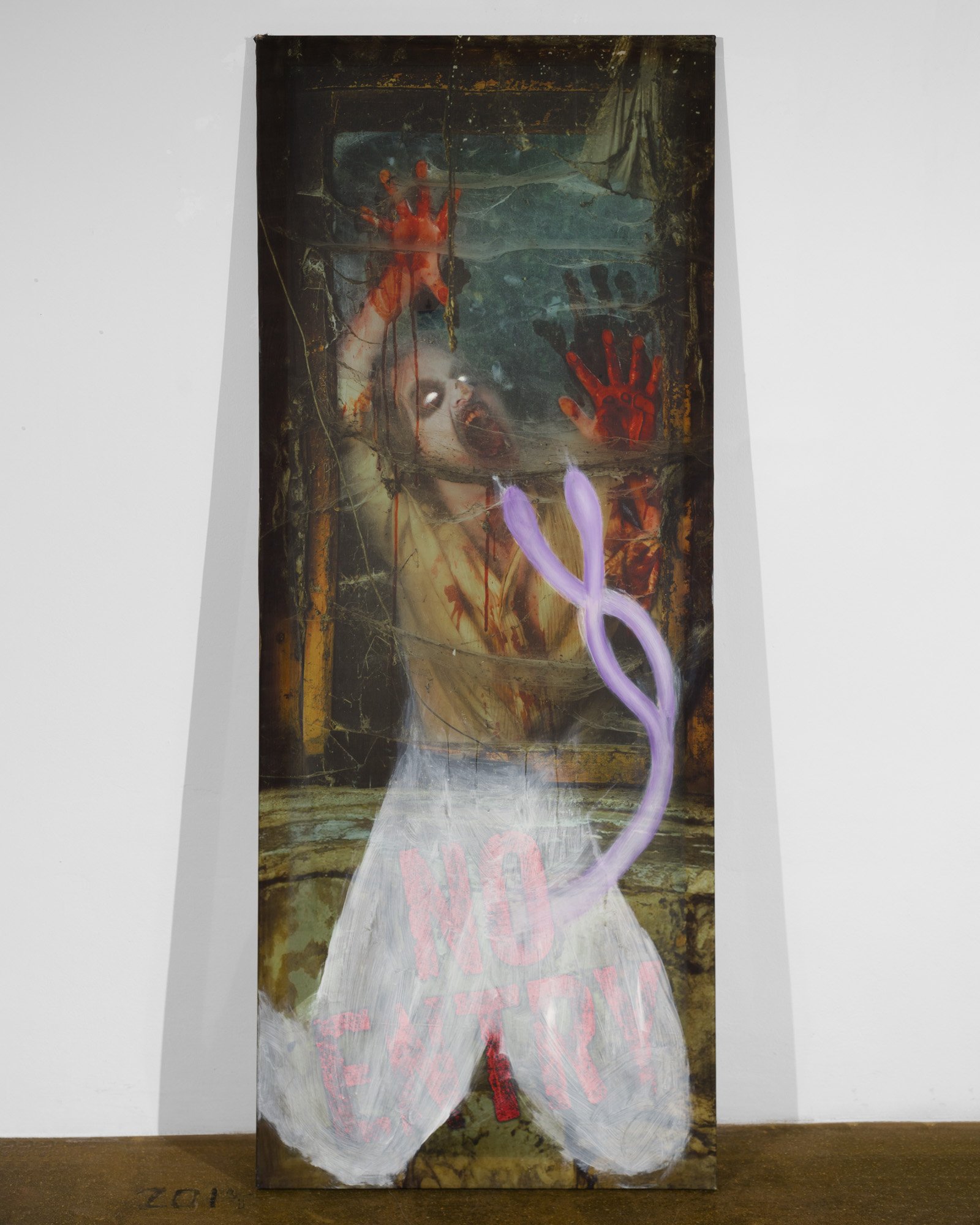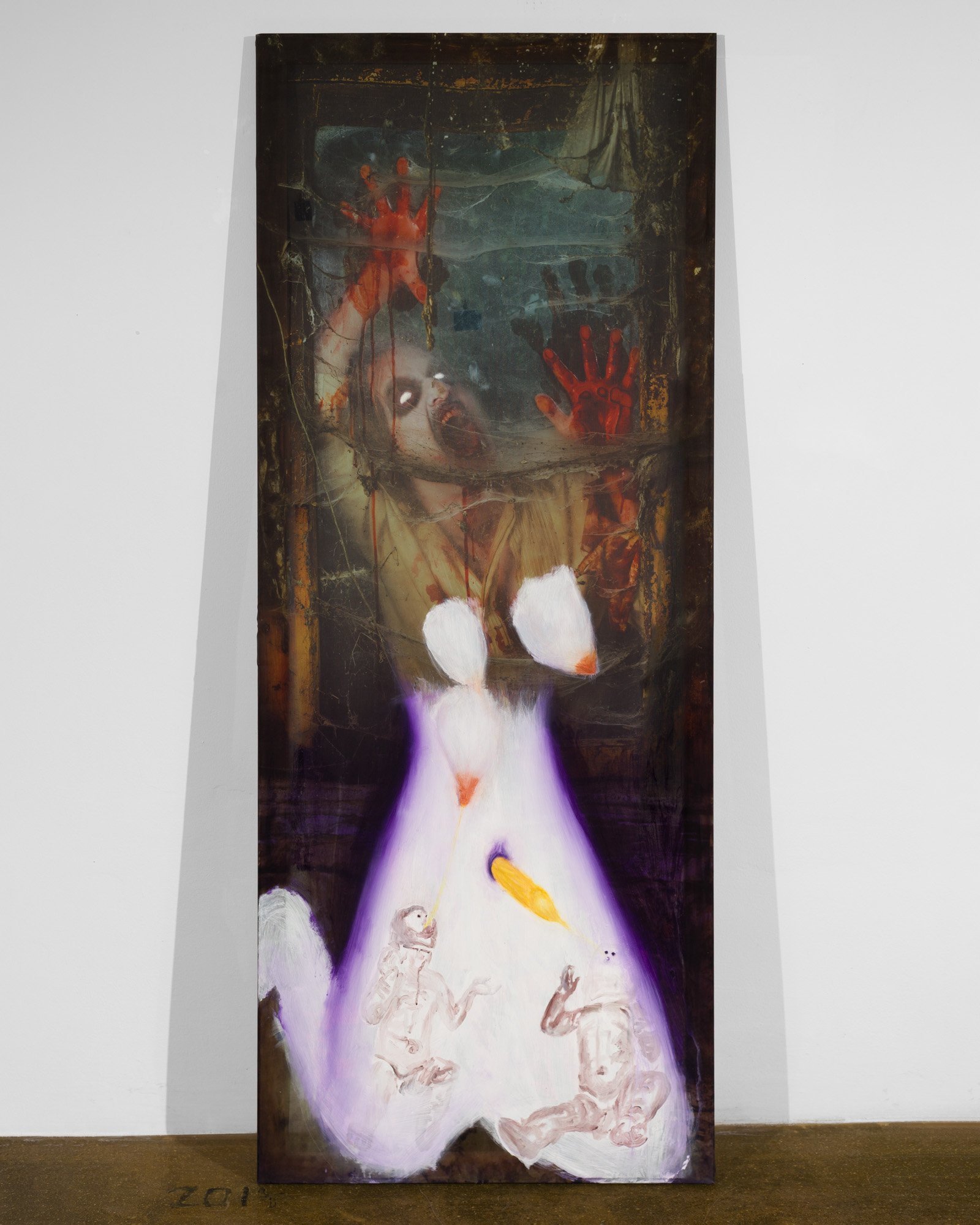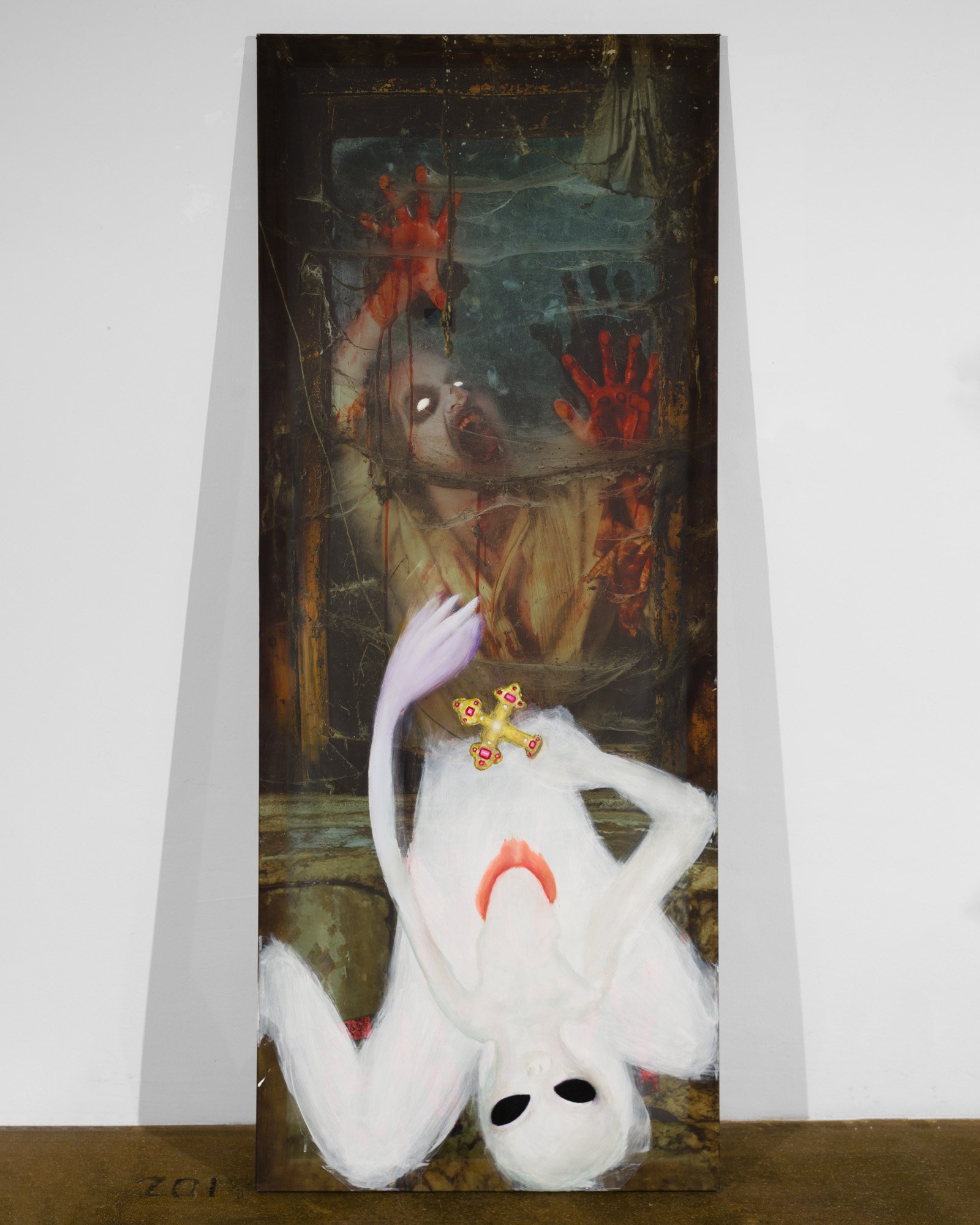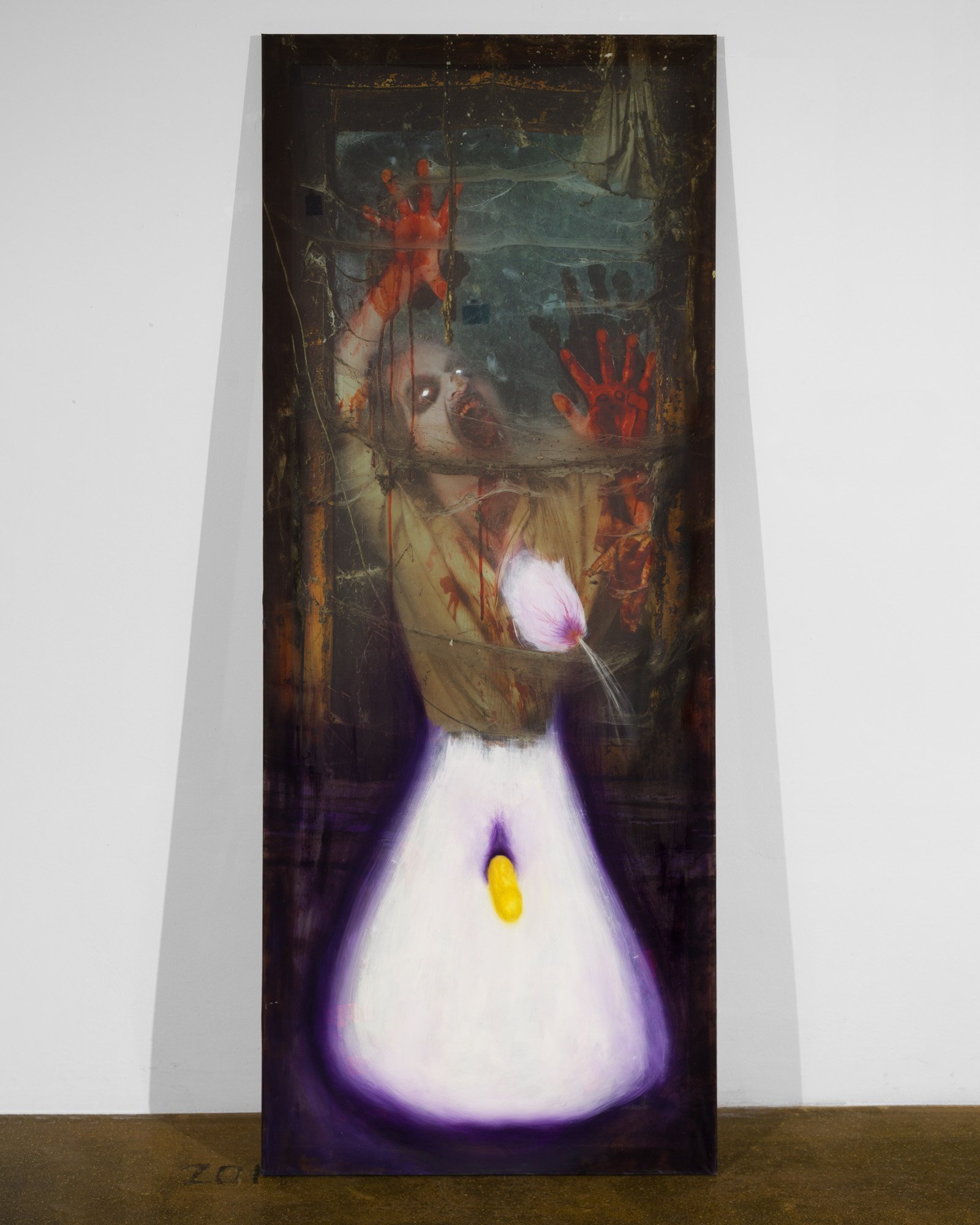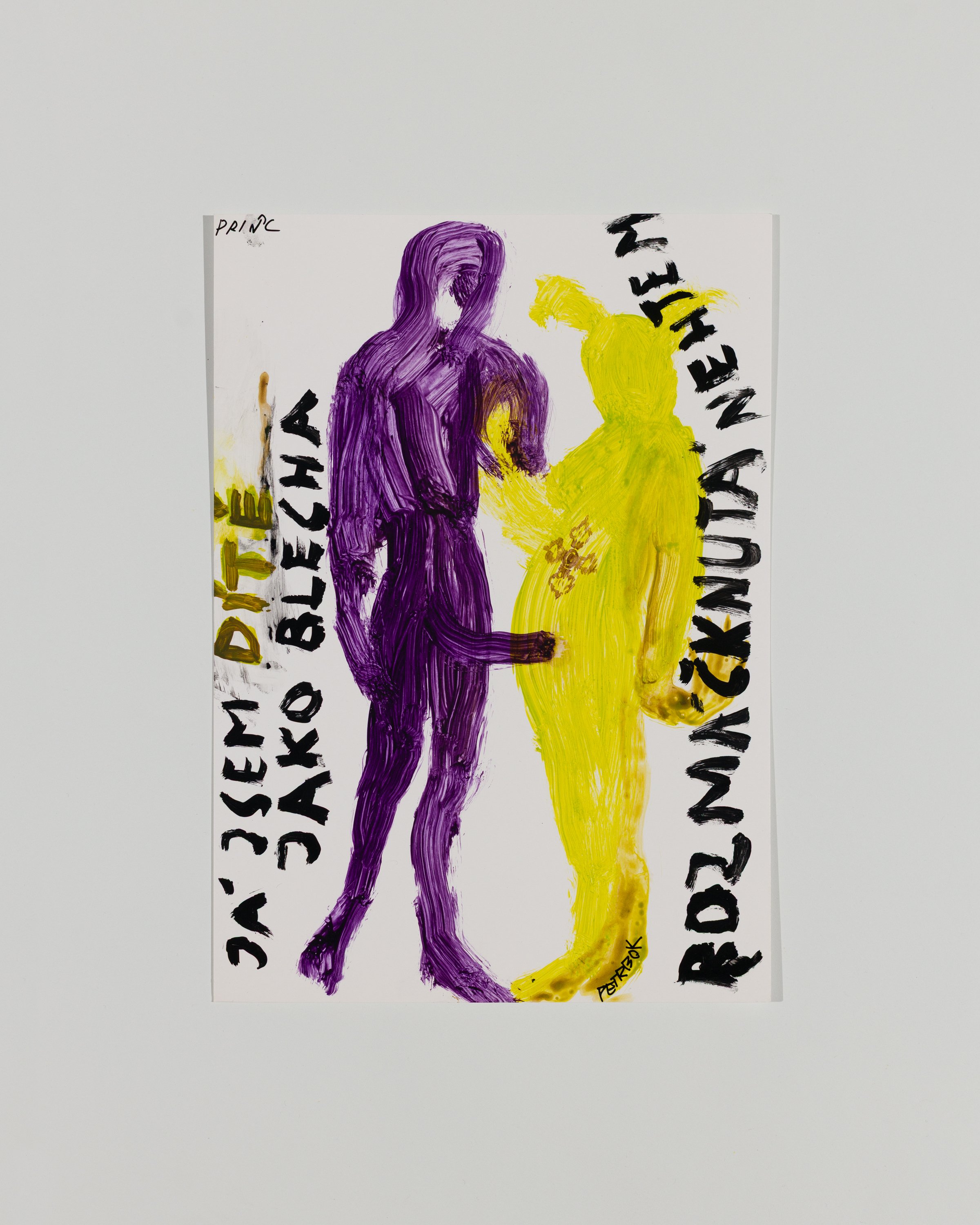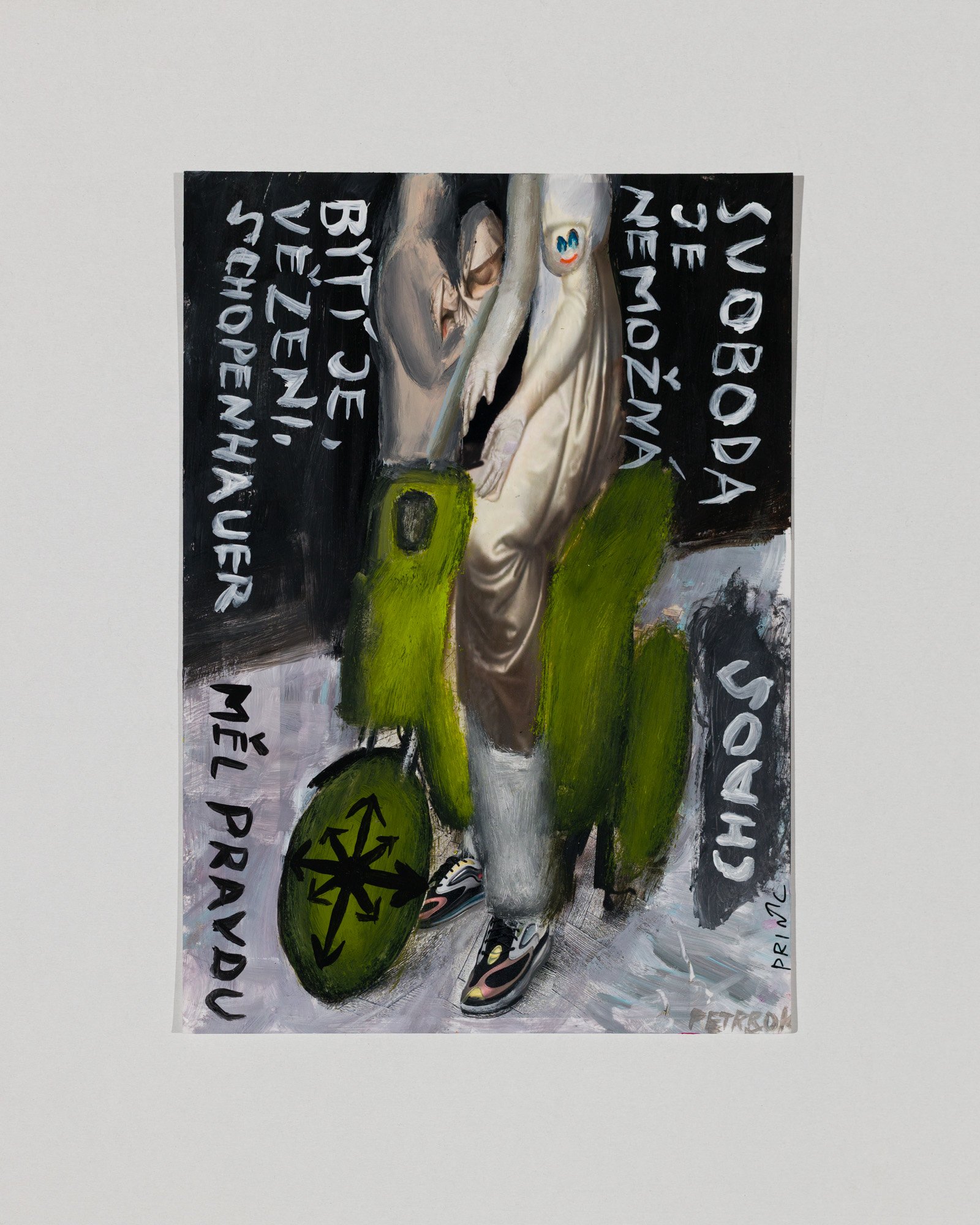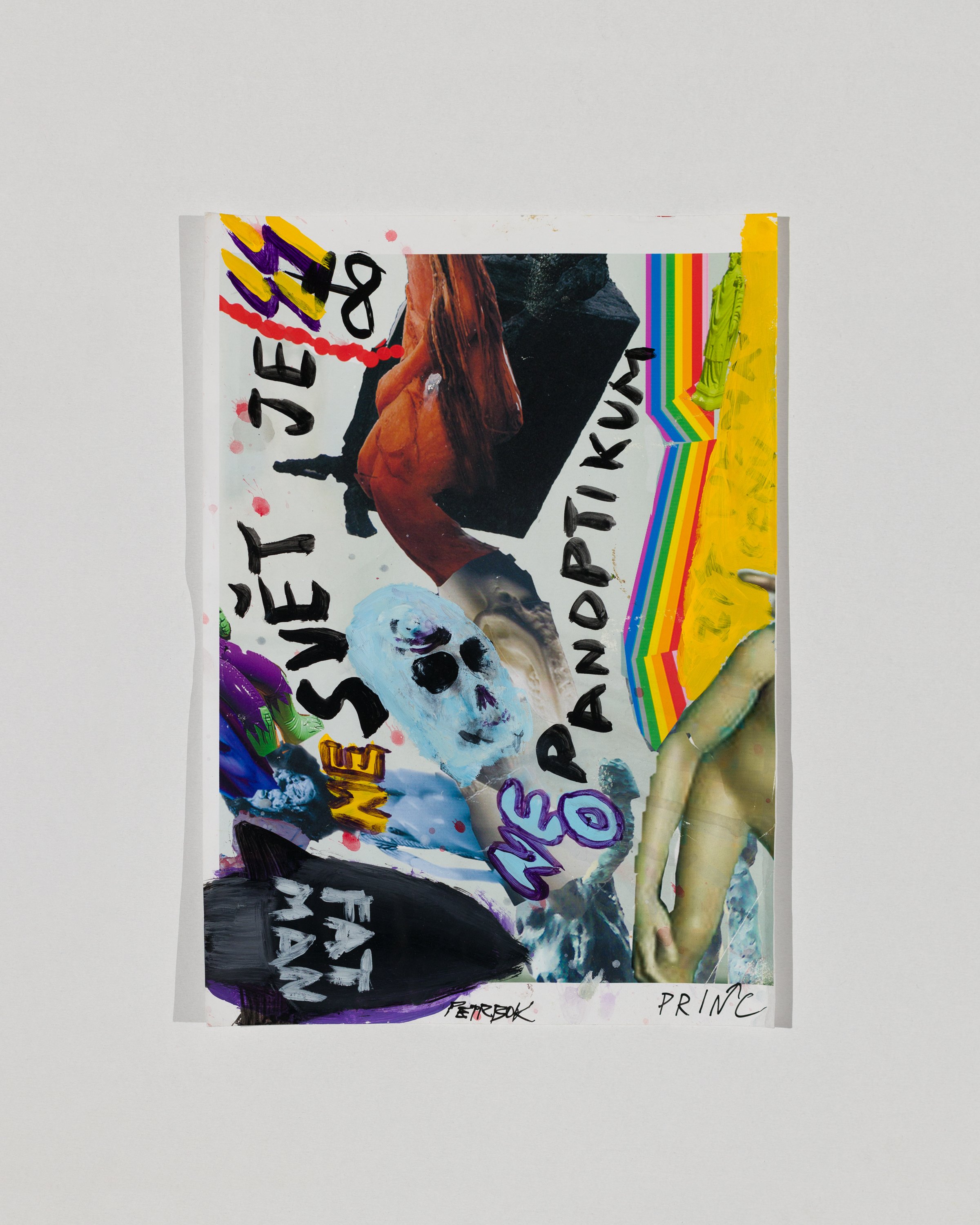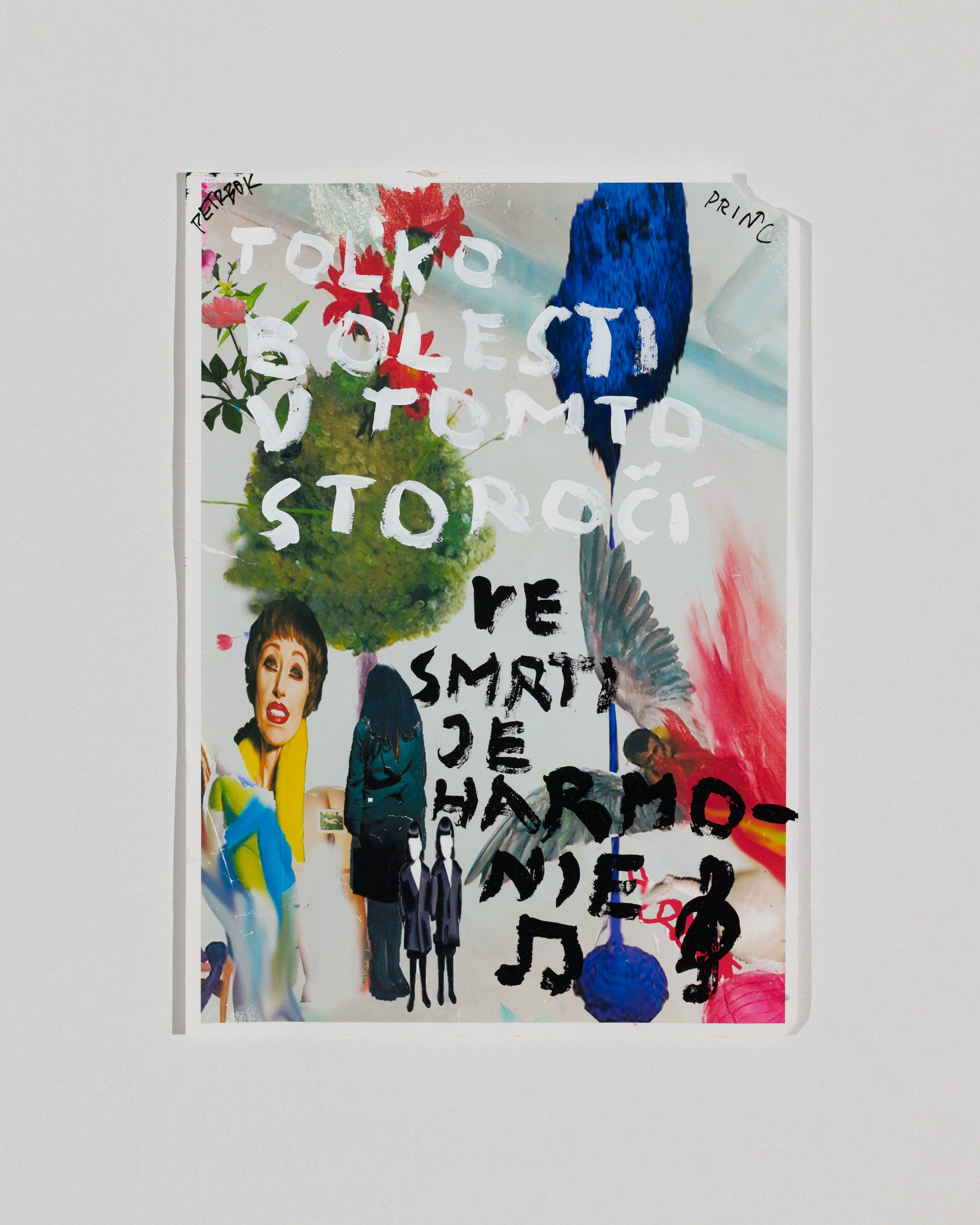Jiří Petrbok, Kamil Princ
MOZKOMOR NIKDY NESPÍ (The Dementor Never Sleeps)
HIDDEN Bořivojova
12. 02. / 12. 4. 2025
opening: 11. 02. 2025, 18:00
After three years of focusing exclusively on international artists, we’re turning our attention back to the Czech art scene—bringing you unexpected encounters with some of its most striking voices.
The exhibition Mozkomor Never Sleeps connects two creative spheres and philosophical approaches: the painter Jiří Petrbok and the poet Kamil Princ, that is, image (imago) and word (logos). However, this is not a harmonious and peace-bringing connection – rather, we are witnessing the collision of two trains, from the burning wreckage of which something unexpected and shocking will emerge.
Petrbok’s work is based on metaphorical depictions of abstract relationships, qualities, and concepts, which he symbolically manipulates much like algebra works with mathematical elements. Instead of numbers, matrices, and polynomials, he uses colors, forms, and shapes, which he places into new equations and contexts, thereby gaining additional meanings. Unlike many surrealist painters who work with dreams and the subconscious, Petrbok’s visual language is grounded in impeccable logic, which communicates with us through complex codes.
Princ, on the other hand, destructively dissects his own poetry, surgically separating individual verses and phrases, and then lays these linguistic segments on the operating table of Petrbok’s prints. By uprooting them from their original context and synthesizing them with the visual work, concepts are created that, although abnormal, are also spiritual, for the torso of the ritualistically sacrificed poem reaches its resurrection as a magical incantation, gaining new life, albeit as a Frankenstein’s monster. This reverse Kafkaesque metamorphosis, from the miasmatically impure to the primordial untainted reality of “actus purus,” is never completed and remains only a brief flash against the backdrop of eternity.
Petrbok, therefore, captures Husserl’s natural world (Lebenswelt) in its naked essence, before it is distorted by our rationalizing mind, while Princ perceives the world through Derrida’s deconstructive linguistics, where words serve as semantic anchors for understanding reality. In other words, the exhibition brings together the principles of seeing the world as a fleeting visual being just before it is distorted by our thought judgments, and the perception of the world through the concepts of language as a communicative code that objectifies our individual reality. The poem becomes an element of the image, and the image an element of the poem, with the boundary between the two collapsing like the walls of biblical Jericho.
Where Princ, with his concept of the word as the “exoskeleton of consciousness,” polemically engages with Plato’s dialogue Cratylus, Petrbok combines three of Patocka’s movements of human existence with Schopenhauer’s will to live (Wille zum Leben). The movement of grounding refers to being thrown into life (Geworfenheit) with an emphasis on accepting the biological body and with it our dark instincts and base needs. The movement of struggle forces us to assert ourselves aggressively and sexually at the expense of others, after which the movement of breakthrough questions the authenticity (Eigentlichkeit) of our way of being and acting, urging us to resist the dictatorship of our inherent tendencies to reproduce recklessly and destroy each other. Pathological sediments in the depths of our soul become the proverbial “Mozkomor,” which never sleeps and instead waits for us to fall into vulnerable lethargy.
There are phenomena that defy the usual categories of human reason, and this exhibition aims to step out of the vicious circle of general normality and explore new forms of combinatorics between visual and written expression. It is only through intellect and creativity (that is, art) that we can not only discover and tame the proverbial Mozkomor of our blind passions but perhaps even domesticate it and reconcile with it.
– Kamil Princ
In his new painting series, Jiří Petrbok crosses yet another limit of madness when he creates a menacing polyptych full of death and sexuality from industrially produced curtains for a child's room. He depicts Christ's resurrection not as a sacred phenomenon, but as a necromantic act, when Jesus, in an advanced stage of decomposition, transforms into a zombie rising from the grave. In the world of the living, he then performs a maniacal sexual ritual involving autoeroticism, copulation with an alien, childbirth, breastfeeding and death – all with a hot dose of sarcasm and blasphemy.
In addition to the expressive and parodic aspect, the five-part mini-series (5 paintings as the 5 peaks of a pentagram) also contains a surprising intellectual level, when the author transforms the same background each time in a different way, thereby exploring the boundaries of difference and authenticity. In his variable concept of individual difference, Petrbok draws on Deleuze's concept of "virtuality" representing a field of potentials and possibilities. These are ideas that are not material, but are capable of acquiring physical form in a certain context and under specific conditions. The painter then contrasts this transformation from spirit to matter with death and extinction, which represent the opposite direction from Aristotle's realization (energeia) of the "being" back to the mere possibility (dynamis) of the "non-being" found in the realm of death. Just as an object is always in motion only in relation to another object, so existing beings can only undergo being in relation to the non-being. Not man, as Protagoras claimed, but death is the only measure of all things!
The idea of "virtuality" is also closely connected with Deleuze's concept of "multiplicity" indicating different possibilities of development or transformation. According to Hegel, everything is change, movement and development. Whether that development is evolution or involution is, of course, debatable. For example, Buddhism perceives change (anicca) negatively as impermanence and transience. Petrbok is well aware of this and consciously depicts the negative change. In his series of undead Christs, he repeats and at the same time updates himself, when none of the modified canvases is treated the same. In this way, he makes us think about the true form of things and their variable attributes, with only fundamental change being the aforementioned death.
The painter's reflections on the insomniac Dementor also open questions about the nature of illusion and reality. In his Meditations on First Philosophy, René Descartes draws attention to how our experiences in dreams can cast doubt on sensory reality. Even if we are convinced of the truth of our experiences in a dream, the state of dreaming shows us that our mind (res cogitans) can exist independently of the world of matter (res extensa). Man is a soul imprisoned in the flesh (soma sema), and since the true seat of the psyche is the spiritual sphere, in the world of matter our spirit suffers constantly and vehemently. From Petrbok's perspective, we are night stars in the daytime sky, for whom it is redemption when they fall from heaven. Instead of exhausted poetic themes and anemic lyrical hints, however, he uses a heavier caliber of naturalistic scenes of death, decay and sexual deviation.
Wisdom (sofia) represents a hopeful, albeit in reality unattainable, opposition to the blind will to life (Wille zum Leben). Instead of loving a perverted or non-existent God, we should love wisdom, but we are not capable of it. Although the author tells us in his paintings that hope and faith in a better future are a grave mistake, this is not a gesture of resignation – quite the opposite. Petrbok considers human suffering a virtue and loneliness a redemption, in which, despite his atheism, he paradoxically comes close in many ways to the approach of a monk of a monastic order. As the Russian writer Lev Shestov declared: “To be irremediably unhappy—this is shameful. An irremediably unhappy person is outside the laws of the earth. Any connection between him and society is severed finally. And since, sooner or later, every individual is doomed to irremediable unhappiness, the last word of philosophy is loneliness.”
– Kamil Princ
HIDDEN Editions
What happens when a painter known for his precise, emotionally charged compositions allows a poet to intervene in his work?
The result is an unprecedented artistic experiment—66 original pieces created in collaboration between Jiří Petrbok and Kamil Princ, merging the disciplines of painting and poetry in a way that neither artist had previously explored.
In their series “Dementor Never Sleeps,” Jiří Petrbok and Kamil Princ meet at the crossroads of painting and literature, which merge like infrared and ultraviolet radiation into one penetrating beam. At first glance, these are two hermetically sealed worlds, which, however, like separate windings of an electrical transformer, magnetically influence each other and thus interfere.
The theme of HIDDEN edition touches on the topic of the subconscious and dreaming. The nature of dreams with their biological and psychological aspects was already analyzed by Aristotle in his treatises “On Dreams” and “On Sleep and Wakefulness”, but Petrbok and Princ’s work mainly refers to the concepts of Gottfried Wilhelm Leibniz, who in his philosophical reflections thought about dreams in relation to metaphysics and the perception of reality. According to Leibniz, dreams can be considered a synthesis of memories and imagination, which are interconnected in the human subconscious as Ovidian metamorphoses of our perceptions influenced by unconscious processes.
In their frantic collages, Petrbok and Princ deconstruct these Paretian derivatives and sneak into our heads like the infamous “Dementor” to experience our own nightmares and reveal the dark sides of the human soul, just as a speleologist maps the dark corners of deep caves. In their daring works, they attack the boundaries of our everyday reality, behind whose mask perhaps a more terrifying truth is hidden than we are willing to admit. They test the limits of morality and social tolerance to the very limit, like an archer tensioning the string of his bow.
Referring to Roland Barthes' essay entitled "The Death of the Author", Petrbok and Princ also change the view of how one can approach not only literature, but also all art as such. First of all, it is about breaking down the author's tyrannical monopoly on the only correct definition of the content of his work. Art should retain its own unique identity, which is fully realized only in the mind and soul of its recipient.
Similar to Barthes's "decentralization of the text", the idea of a work as a dynamic and multilayered object arises, which is not anchored by one singular interpretation, but opens up an entire multiverse of views. The paintings of Petrbok and Princ can therefore be understood as a territory for the creation of one's own ideological constructions and a stimulus for phenomenological investigation of the structures that surround us in the rhizomatic network of being. The exhibition in HIDDEN therefore gives visitors the freedom for their own unique interpretation, when even the most subtle detail can unlock hidden doors to new unsuspected spheres in its observer.
– Kamil Princ



